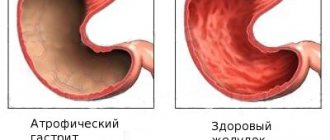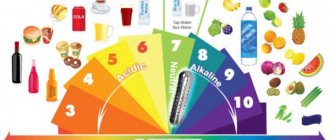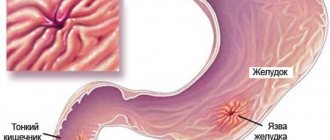At this point in time, much attention is paid to diseases associated with high stomach acidity. At the same time, many people forget about such a problem as low stomach acidity (hypochlorhydria) and its effect on digestion.
The normal course of the digestion process directly depends on the amount of hydrochloric acid, and a special gland located in the mucous membrane is responsible for its production in the human body. If the acidity of the stomach is reduced, then this provokes many health problems.
What causes acidity levels to decrease? How to distinguish high acidity from low acidity?
Epidemiology
According to statistics collected by foreign gastroenterologists, approximately 28% of patients face the problem of insufficient stomach acidity. It is important to note that it manifests itself in middle age - by the age of 40. Moreover, the older a person gets, the higher the risk of problems with acidity levels. By the age of 50, the problem is observed in 40-45% of patients, by 70 – in 75%.
Causes
Low acidity can be caused by several reasons, the main one being a reduction in the amount of hydrochloric acid produced; this function is performed by glands located in the mucous membrane of the fundus of the stomach.
A decrease in the secretion of hydrochloric acid can be due to the following factors:
- Ingestion of Helicobacter Pylori bacteria into the stomach (they create conditions conducive to the neutralization of stomach acid);
- Reduction of the gastric mucosa;
- Slow metabolism caused by problems with thyroid function;
- A change in the acid-base balance in the stomach manifests itself against the background of diseases accompanied by the loss of chlorine ions due to vomiting or diarrhea;
- Stomach cancer or radiation therapy that affects the functioning of the organ;
- Pancreatic islet cell tumors;
- Pituitary adenoma, leading to increased production of a hormone that regulates the endocrine system;
- Autoimmune gastritis is characterized by the death of mucosal cells, which affects all parts of the stomach;
- Zinc deficiency in the body;
- Low levels of thiamine and niacin.
Risk factors
Among the risk factors that increase the likelihood of decreased stomach acidity are:
- Poor nutrition or diets that limit food intake;
- Increased carbohydrate intake;
- Inflammatory processes in the intestines that have a negative effect on the production of hydrochloric acid;
- Unstable emotional state and depression on a regular basis;
- Gluten intolerance;
- Elderly age.
Also, neutralization of the effect of acids contained in gastric juice can be a consequence of taking soda and antacids for a long period of time. In addition, there are certain drugs and agents, the effects of which lead to a decrease in the production of hydrochloric acid.
Causes
External reasons:
- malnutrition (dry food, snacks, poor chewing of food contribute to the appearance of mechanical injuries to the gastric mucosa, excessive consumption of salty and spicy foods contributes to irritation of the mucous membrane, too cold or hot food - thermal damage to the mucous membrane);
- damage to the stomach by Helicobacter pylori and other bacteria and fungi;
- foreign bodies entering the stomach;
- smoking and excessive drinking (which release caustic chemicals into the stomach);
- long-term use of medications (in particular glucocorticoid hormones, acetylsalicylic acid, NSAIDs, iron supplements, etc.);
- exposure to radiation on the mucous membrane;
- contact with mucous membranes of alkalis, acids and other toxic substances;
- parasitic infestations;
- chronic stress (acute stress gastritis can be a consequence of a serious illness, injury, life-threatening conditions, etc.).
Internal reasons:
- genetic predisposition (presence of gastritis in close relatives);
- duodenogastric reflux (reflux of fluid from the duodenum into the stomach);
- autoimmune processes that damage stomach cells;
- chronic infectious diseases (including salmonellosis, coronavirus, rotavirus infections, etc.);
- metabolic disorders;
- endocrine disorders;
- lack of vitamins, etc.
Symptoms of low stomach acidity
If a person experiences belching and discomfort in the stomach after eating, this indicates a high pH of gastric juice. It is important to note that belching may occur several hours after finishing a meal. This symptom indicates that the food is in the stomach; if a person had a normal level of acidity, then it should be in the small intestine, since enough time has passed for it to be digested. For this reason, low stomach acidity leads not only to abdominal discomfort, but also to nausea.
If the acidity of the stomach is low, the symptoms are the following: bloating, diarrhea or constipation, unpleasant odor from the mouth, the presence of a white coating on the tongue, the presence of undigested food fragments in the stool, weight loss, discomfort in the rectum, regular fatigue.
What to do if your stomach hurts after eating? It is important to note that low stomach acidity in most cases is not accompanied by pain; if it occurs, it affects the area from the abdomen to the throat, occurs after heartburn, and is short-lived.
This significantly complicates the identification of pathology at an early stage, since people view the situation as a temporary problem, use a standard set of medications for abdominal pain and do not visit the doctor’s office to undergo a comprehensive examination aimed at identifying pathologies and problems with the gastrointestinal tract.
If a person has a reduced level of hydrochloric acid contained in gastric juice over a long period of time, and against this background a deficiency of certain substances appears, then a conclusion about the presence of a problem can be based on the presence of the following factors:
- Infections caused by fungi in a chronic form and intestinal infestations that occur on a regular basis;
- Food allergies and poisoning with chemical components;
- Irritable bowel syndrome;
- Weakness in the arms and legs, numbness and tingling;
- Acne, eczema, skin rashes;
- Increased dryness of the skin, decreased strength of nails, loss of hair integrity, hair loss;
- Unstable emotional state, sleep problems, memory impairment.
What danger does low stomach acid pose to humans?
The level of acidity of the stomach and gastric juice directly affects the normal functioning of digestion and the state of the immune system. A decrease or decrease leads to problems with digestion and the immune system. For this reason, it is recommended to pay special attention to any discomfort or pain that occurs after eating.
This is a signal that there are digestive problems that need to be solved, and for this you need to make an appointment with a gastroenterologist and undergo an examination. Otherwise, complications and negative consequences are likely to occur.
Complications and consequences
Acid in the stomach has a great influence on the process of protein digestion, promotes the proper functioning of the sphincters of the stomach and the further movement of its contents, helps neutralize bacteria and fungi entering the stomach that pose a potential danger to the body, and takes part in the production of pancreatic juices by the pancreas. An acidic environment promotes the absorption of substances necessary for the normal functioning of body systems.
For this reason, low acidity leads to the following consequences: decreased resistance of the body to intestinal infections and viruses appearing in the gastrointestinal tract, protein deficiency caused by its loss during food digestion, anemia caused by decreased iron levels, deficiency of vitamins and folic acid, reduced production of bile and pancreatic enzymes.
Against the background of these consequences, many pathologies can appear; for this reason, it is recommended to pay special attention to the level of acidity, since problems with it can cause diseases. If this situation is ignored for a long period of time, then in the long term, pathologies associated with blood circulation and organ function, including the gastrointestinal tract, can be diagnosed.
Heartburn is a very unpleasant sensation caused by irritation of the esophagus.
The symptoms of heartburn themselves manifest themselves in the same way in all people, although to varying degrees. This is a burning sensation in the esophagus caused by the splashing of stomach juices, but according to some doctors, the cause of heartburn may also be pepsin and pancreatic enzymes. In any case, it is recommended to see a gastroenterologist to understand the causes of the disease.
It is noteworthy that the treatment of heartburn is quite simple, and in most cases can be done at home. But if heartburn after eating is accompanied by belching, then you need to know that this may be a sign of a gastric ulcer. If you are occasionally exposed to heartburn, then this is absolutely normal, but if it occurs constantly, then you definitely need to be checked for the presence of ulcerative diseases so that gastritis or duodenitis does not develop.
It is also interesting that almost a third of the population wants to know how to get rid of heartburn, because they have been suffering from this discomfort for many years. Older people whose heartburn has already entered the chronic stage are more susceptible to the disease. Also, in most cases, or rather in 80%, the disease manifests itself in pregnant women, and in this situation, the treatment of heartburn should be much more thrifty.
Diagnostics
If the first symptoms of low stomach acid appear, it is necessary to undergo diagnostics to confirm the diagnosis. To do this, the patient must undergo a blood test, after which the composition of the gastric juice is examined to determine its pH, for this purpose probing is used.
Acidity in all parts of the stomach can be determined through instrumental diagnostics - intragastric pH-metry. This method allows the doctor to form a complete picture of the level of acidity in the patient’s stomach, identify problem areas and begin drawing up a treatment plan taking into account the data obtained. This approach is the most effective in terms of achieving a positive result.
Practical implementation of the survey
As part of the examination, the patient undergoes several procedures; based on the results obtained, the doctor forms an idea of the scale of the problem and the overall clinical picture.
First of all, the patient is sent for an ultrasound of the gastrointestinal tract, after which he undergoes endoscopy of the stomach, then an x-ray of the stomach and duodenum; at the final stage of the examination, differential diagnosis is performed, special attention is paid to it, since the pathology in question can be caused by various reasons.
Methods for determining acidity
There are a number of methods for determining the acidity of gastric juice. Some of them are not very convenient, some are not very accurate. There are two main methods currently in use.
The first of them is the determination of acidity directly during FGDS. When a dye is introduced through a probe during a study and the acidity is judged by the color change. But this is only an indirect definition. But the “gold standard”, the most informative and physiological method is intragastric pH-metry. A probe is inserted into the stomach, which allows you to simultaneously determine the acidity in different areas of the stomach.
From all of the above, the following conclusions can be drawn.
If you are concerned about any of the above symptoms, then you need to take action to maintain and strengthen your health.
You need to contact a gastroenterologist, who, depending on your complaints and symptoms of the disease, will prescribe the necessary examination. And based on the results of the examination, you will receive specific recommendations on nutrition, lifestyle changes that you need, and receive medication prescriptions. After all, under-examination and self-medication can lead to irreparable loss of health. Remember this. We are waiting for you at our clinic.
Treatment
Based on the results of the diagnosis and taking into account the existing symptoms, the doctor prescribes a course of treatment for the patient. Low stomach acidity, the symptoms of which are the main guideline in developing a course of treatment, can be successfully restored. The doctor pays special attention to the choice of drugs, since the problem is specific, and the properties of some drugs may have a negative effect on its manifestation.
In most cases, in practice, a method is used that involves increasing the production of hydrochloric acid, which helps normalize digestion and, as a result, helps solve the problem.
To do this, the doctor is recommended to take HCl preparations and enzyme medications that replenish the deficiency of endogenous digestive enzymes.
As part of the treatment, the patient follows a diet, during meals he takes a solution of hydrochloric acid, concentrated gastric juice, pepsin, the dosages of the drugs are prescribed by the doctor.
How to improve low stomach acidity?
If your stomach hurts after eating and a doctor’s appointment is diagnosed with low stomach acidity, then it is recommended to include foods that increase stomach acidity in your diet. It is necessary to regularly eat vegetables and fruits high in vitamin C, ginger root (ginger tea), fermented vegetables (fermented), and fermented milk products.
Pumpkin seeds, potatoes, beans, peanuts, whole grains, bread and brown rice can increase your body's zinc levels, which have a big impact on HCl production. You can improve the absorption of zinc by taking vitamin complexes.
Prevention
At this point in time, the prevention of low acidity consists of reducing the consumption of animal proteins. Instead, it is recommended to include foods containing plant proteins in your diet. Another important recommendation is to reduce or completely eliminate sugar, while consuming enough fiber.
If your stomach hurts after eating, but you need to pay attention to your diet and reconsider it. It is best to switch to separate meals, when proteins and carbohydrates are taken separately, and fruits are also consumed separately, after completing the main meal.
Consumption of probiotic products has a positive effect on the formation of a normal balance of intestinal and stomach microflora, therefore their consumption has a positive effect on stabilizing acidity levels.
Forecast
What to do if your stomach hurts after eating? First of all, consult a doctor and get examined. If low stomach acidity is diagnosed, then you need to undergo a course of treatment and follow the doctor’s recommendations. Predicting the consequences of low stomach acid is a difficult task. To solve it, it is necessary to follow an integrated approach, take into account all the symptoms, the patient’s health status, possible risks and complications, and only make a prognosis based on all this information. But you need to take into account that the worst-case scenario is often oncology.
We provide paid medical services to our clients; you can make an appointment with a doctor using a form on the website or by phone; all messengers are also available.
To find out the cost of seeing any of the specialists or to get answers to questions, you can call the 24-hour hotline: +7.
Watch a useful video about the causes of low stomach acidity










